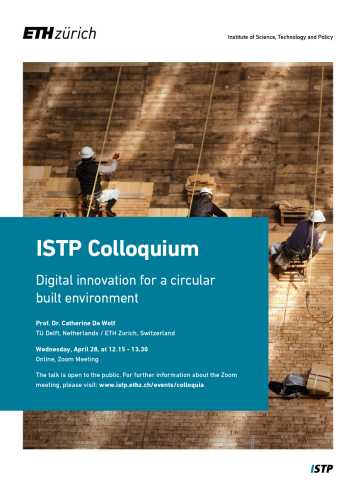Colloquium: Prof. Catherine De Wolf
Wednesday, April 28, 2021, at 12.15 - 13.30
Online, Zoom | Sign up here
Digital innovation for a circular built environment

The construction sector is the most resource-intensive sector, producing a third of all waste generated in Europe and more than a third of global greenhouse gas (GHG) emissions. To address this, a transition to a regenerative circular model is urgently needed, using ‘reduce, repair, reuse, recycle & recover energy’ strategies, which have been challenging to apply on a large scale in practice so far. Digital innovation could fill this gap. This presentation will review how existing platforms can enable a linear-to-circular paradigm shift through Building Information Modeling (BIM), Artificial Intelligence (AI), blockchain technologies, robotic manufacturing, Internet of Things (IoT). A collaboration between computer scientists and architects/engineers/contractors is needed to build a roadmap for viable automated circular strategies towards the goal of carbon-free buildings by 2050.
About Prof. Catherine De Wolf
After studying Civil Engineering and Architecture at the Vrije Universiteit Brussels (VUB) and the Université Libre de Bruxelles (ULB), she obtained a Masters of Science in Building Technology at the Massachusetts Institute of Technology (MIT). This was followed by a PhD in Architecture: Building Technology at MIT with Prof. John Ochsendorf. Her dissertation was about low carbon pathways for structural design. During her PhD, she also worked in the Department of Engineering at the University of Cambridge, as well as in Kuwait and in South Africa.
Catherine De Wolf is currently Assistant Professor at Delft University of Technology, Netherlands and has been appointed as Assistant Professor at the Department of Civil, Environmental and Geomatic Engineering at ETH Zurich. She conducts research on efficient, environmentally compatible construction processes. Her work has a particular emphasis on the processing and recycling of waste products. In her new post she will build on synergies with the Department of Mechanical and Process Engineering and deepen links with the Department of Architecture, the Department of Engineering Sciences at Empa, and NEST, the modular research and innovation building of Empa and Eawag.
You can read a Summary of the Colloquium Talk on our Reports page.
You can also download the presentation of the talk protected page here (accessible only by ETH members).